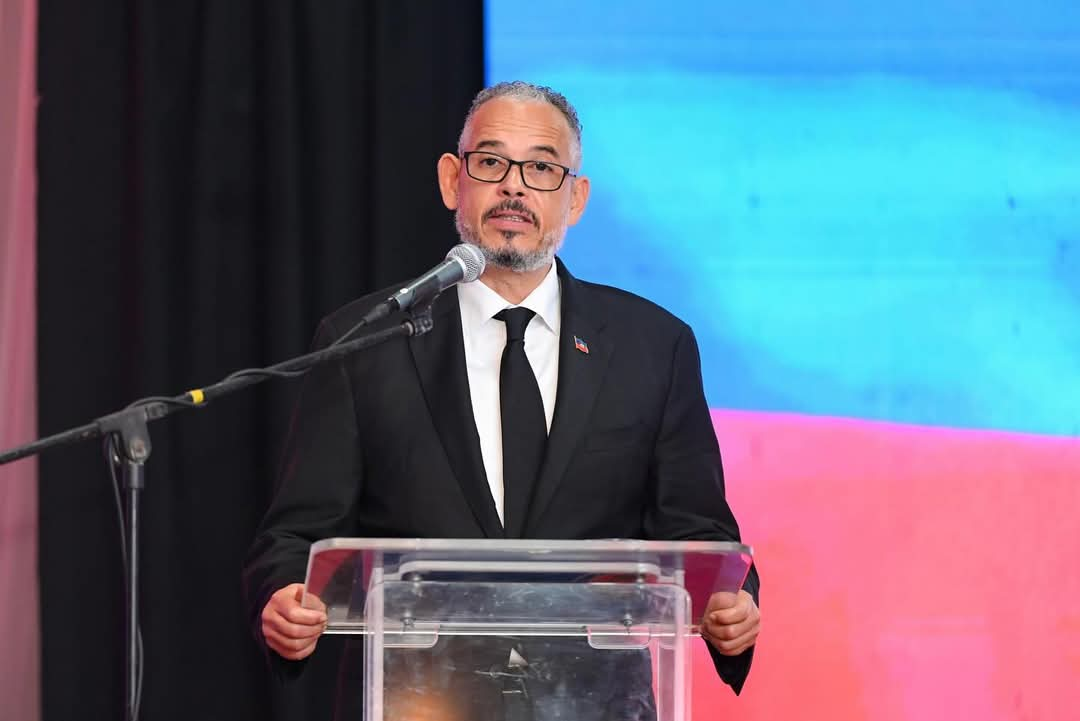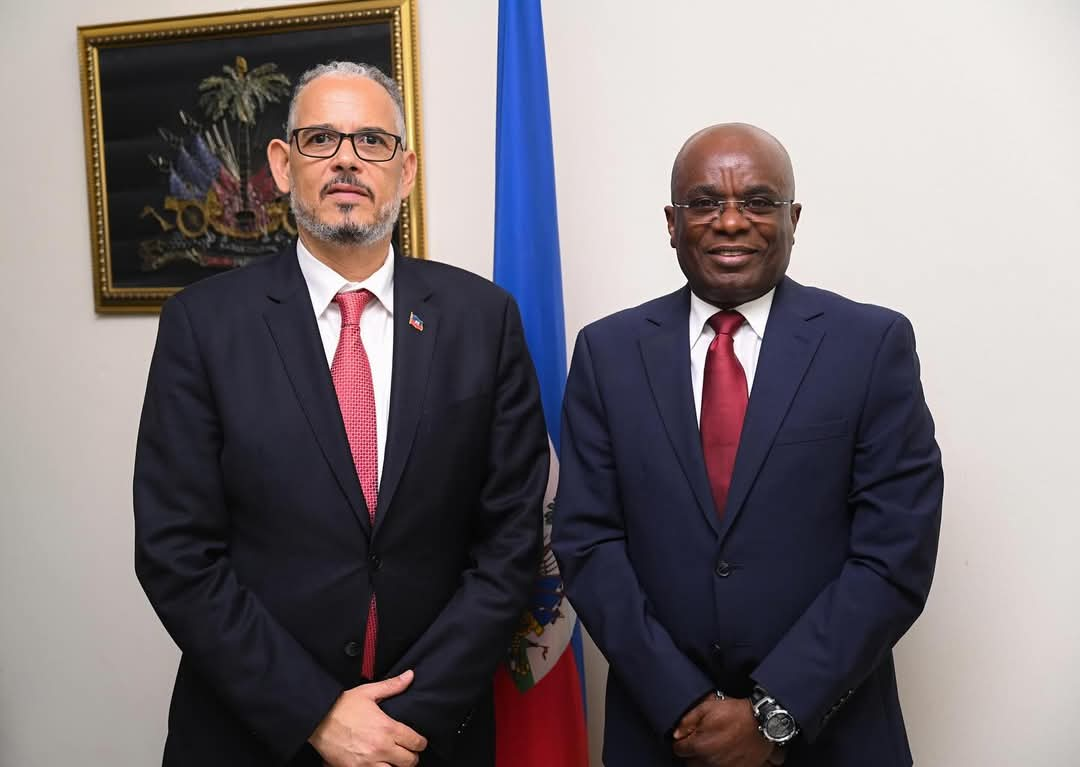New York, May 2025 — As the heat rises in a city weighed down by anxiety, the words of Haiti’s Prime Minister Alix Didier Fils-Aimé echo daily through press conferences and official communiqués: stability, elections, reform. But far from the calm chambers of government buildings, the nation’s people are caught in the harsh rhythm of sirens, hunger, and silence.
Six months after Fils-Aimé assumed office under the transitional government led by the Presidential Council, we walked the streets of Port-au-Prince, Carrefour-Feuilles, Les Cayes, Delmas, and Cap-Haïtien to hear the voices behind the statistics.
We met five Haitians: an optimistic tech entrepreneur, a disillusioned schoolteacher, a grieving former police officer, a young displaced woman, and a street vendor barely making ends meet. Their lives reflect the complexity of a country suspended between exhaustion and fragile expectation—where faith in change remains elusive.
“I Still Believe in Reform”
– Joham, 29, tech entrepreneur in Cap-Haïtien
In a sunlit co-working space in northern Haiti, Johan speaks in the confident tone of someone who sees beyond crisis.
“I’m part of the generation that doesn’t want to run anymore. I’ve invested everything I have into building a startup that solves problems—logistics, mobile payments, and job connections for young people. I believe Fils-Aimé understands this need.”
Joham says the Prime Minister’s business-minded approach resonates with him. “For once, we don’t have a traditional politician in power. He ran a company, led chambers of commerce. He understands systems, not just slogans.”
Still, Joham admits the stakes are high. “If the gangs win again, if elections are postponed again, if we see more committees than results—I’m out. I’ll apply for Canada and leave.”
But for now, he’s staying. “Fils-Aimé may not inspire crowds, but he thinks long-term. That’s rare here.”
“He’s Talking, but We’re Dying”
– Marie-Denise, 43, schoolteacher and mother of two, Carrefour-Feuilles
Marie-Denise barely speaks above a whisper when recounting what happened last November: her brother was killed outside their home during a midday gang clash. Her children haven’t set foot in a classroom since January.
“I try to teach them at home,” she says, glancing at a small chalkboard leaning against her wall. “But how can you teach when there’s no electricity, no peace?”
She remembers when police used to patrol her neighborhood. “Now the gangs move like kings. They collect ‘taxes,’ they decide who opens their business, who leaves the zone.”
To her, the Prime Minister’s statements feel distant and sanitized. “They always say they’ll restore the rule of law. But we live in lawlessness.”
Does she believe in the roadmap Fils-Aimé proposed?
“No,” she says, shaking her head. “It’s not about him. It’s the system. You pour clean water into a dirty glass—it will still be undrinkable.”
“Nothing Changes But the Faces”
– Jonas, 61, retired police officer, Les Cayes
Jonas remembers a time when people feared uniforms, not gangs.
“I served 25 years. I was proud to wear the badge,” he says from a rickety wooden chair on his porch. “Now, those who wear it are afraid to leave the station.”
He’s skeptical of the transitional government’s ability to deliver change. “Every administration starts with a ‘recovery plan.’ We’ve had more plans than paychecks.”
Jonas followed the recent dissolution of the CNDDR (the disarmament commission) with particular attention. “That commission was compromised. But what’s replacing it? Another commission?”
For him, real change requires force and justice, not just strategy papers. “If you can’t arrest the men burning down police stations, how will you prepare elections?”
He sighs. “We’ve had Ariel Henry for three years and now nine presidents, two transitions, two prime ministers, no peace. Maybe it’s not about the man in charge. Maybe it’s about the fact that the Republic doesn’t work.”
“I Just Want a Life Again”
– Michaëlle Pierre, 20, displaced resident now living in a church shelter in Delmas
Michaëlle once dreamed of becoming a nurse. Today, she shares a single room with seven relatives in a church compound, after fleeing the gang-controlled neighborhood of Martissant.
“Everything happened so fast. One day we were home, and the next we were hiding under beds, waiting for gunfire to stop.”
She says she heard about the Prime Minister’s plan for a humanitarian corridor, but nothing changed for her. “It’s just words. No one comes here. Not from the UN, not from the government.”
She holds up a battered phone. “I lost my ID when we ran. I don’t even know if I’ll be able to vote, if elections even happen.”
When asked if she trusts this government, she hesitates.“I don’t know. I just want peace. That’s all. Whoever gives us that—I’ll vote for them, I’ll thank them, I’ll even pray for them.”
Asked what she hopes for, her answer is simple. “I just want a door I can lock. A kitchen. A life.”
“The Street Is Dead”
– Louis, 48, vendor selling plantains and yam in Pétion-Ville
Once a thriving sidewalk salesman, Louis now struggles to sell even the basics. “This street used to be full. Now it’s full of fear.”
He’s watched as displaced people flood into Pétion-Ville, escaping violence from surrounding communes. “I get it—they’re running from worse. But for us who live here, it’s chaos.”
Louis voted in every election since 1990. This time, he’s not sure he will. “Why should I vote when nothing changes? When my taxes disappear and my cart gets pushed aside by police with no explanation?”
He shrugs. “Fils-Aimé is not loud. He doesn’t insult people. Maybe he’s decent. But good people don’t last long in Haitian politics.”
His biggest fear? “That it gets worse. That by next year, I won’t even be here to complain.”
Between Fragility and Faith
The Prime Minister, for his part, insists that progress is coming. At a recent press briefing, he reaffirmed his commitment to establishing a National Security Task Force, organizing elections, and improving state capacity.
But outside those official spaces, faith runs thin. The Haitian people, already experts in survival, are not easily swayed by rhetoric. Many still wait to see if this leader will be different—or if he too will be absorbed by the machinery of dysfunction.
As Joham puts it: “He has a chance and the intention. But the question is—does he have time?”
For now, Haiti watches. And waits.
Haiti Post




